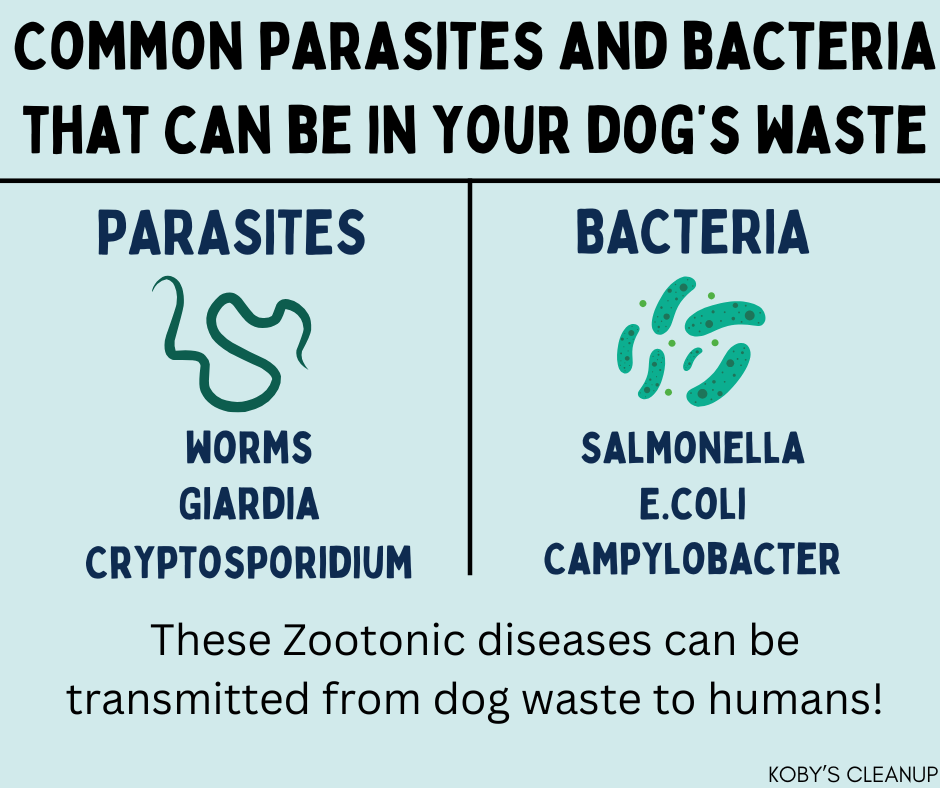Zoonotic diseases, also known as zoonoses, are infectious diseases that can be transmitted from animals to humans. In this case, we’re talking about the potential for diseases to spread from dog waste to humans.
We love our furry companions, and picking up after them is just part of the deal, right? But beyond the icky factor and the social responsibility, there’s a real health concern we need to address: the potential for disease transmission from dog waste to humans.
It might not be something you think about every day, but dog feces can harbor a surprising array of parasites, bacteria, and viruses that can make us sick. These microscopic troublemakers can survive in the environment for extended periods, posing a risk long after you’ve walked away.
So, what exactly are these hidden dangers? Let’s break down some of the common culprits:
Parasitic Threats

- Roundworms: These intestinal parasites are common in dogs, especially puppies. Their eggs are shed in feces and can survive in soil for years. If accidentally ingested by humans (through contaminated soil or hands), roundworm larvae can migrate through the body, potentially causing organ damage, eye problems, and even blindness (visceral and ocular larva migrans).
- Hookworms: Similar to roundworms, hookworms live in the small intestine of dogs. Their larvae can penetrate human skin (often through bare feet) and migrate through the body, causing itchy rashes (cutaneous larva migrans) and potentially intestinal issues.
- Whipworms: These parasites reside in the large intestine of dogs. Their eggs are very resilient in the environment. While less common in humans, ingestion of whipworm eggs can lead to abdominal pain, diarrhea, and weight loss.
- Giardia: This single-celled parasite causes giardiasis, a common intestinal infection in both dogs and humans. It’s spread through the ingestion of contaminated feces or water. Symptoms in humans include diarrhea, abdominal cramps, nausea, and dehydration.
- Cryptosporidium: Another microscopic parasite that can cause cryptosporidiosis, a diarrheal disease. Like Giardia, it’s transmitted through the fecal-oral route and can contaminate water sources.
Bacterial Concerns:
- E. coli (certain strains): While some E. coli strains are harmless, others can cause severe gastrointestinal illness, including bloody diarrhea and kidney failure (especially in young children and the elderly). Dogs can carry and shed these harmful strains.
- Salmonella: This bacteria can cause salmonellosis, characterized by diarrhea, fever, abdominal cramps, and vomiting. Dogs can carry Salmonella without showing symptoms, shedding it in their feces. Transmission to humans can occur through contact with contaminated feces or surfaces.
- Campylobacter: Another bacterial infection that can lead to diarrhea (often bloody), abdominal pain, fever, and nausea. Dogs can be carriers, and transmission to humans can happen through fecal contamination.

Viral Risks (Less Common but Possible):
While less frequently transmitted through feces compared to parasites and bacteria, some viruses can potentially be present in dog waste. These might include certain types of parvovirus or other enteric viruses, although the risk of direct transmission to humans is generally considered low.
Who is Most at Risk?
While everyone should take precautions, certain groups are more vulnerable to infections from dog waste:
- Young children: They often play in soil and have a tendency to put their hands in their mouths.
- Individuals with weakened immune systems: Their bodies are less able to fight off infections.
- Pregnant women: Certain infections can pose risks to the developing fetus.
- The elderly: They may have a reduced immune response.

Protecting Yourself and Your Community:
The good news is that preventing the spread of these nasty bugs is relatively simple:
Regular veterinary care for your dog: Routine deworming and fecal exams can help keep your dog healthy and reduce the shedding of parasites.
Always pick up after your dog: Use a bag and dispose of the waste properly in a designated bin. Don’t leave it on the sidewalk, in the grass, or near water sources.
Wash your hands thoroughly: After handling dog waste, even if you used a bag, wash your hands with soap and water for at least 20 seconds.
Teach children about hygiene: Emphasize the importance of not touching dog waste and washing their hands after playing outdoors.
Prevent your dog from defecating in gardens or play areas: Discourage your dog from doing their business in areas where people, especially children, might come into contact with the soil.
Dog ownership brings immense joy, and by being responsible pet owners and taking these simple precautions, we can protect ourselves, our families, and our communities from the unseen dangers that can lurk in our beloved companions’ waste. Let’s keep our parks, sidewalks, and yards clean and safe for everyone!


